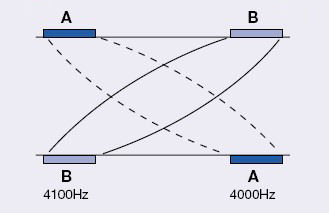What is the better way to relieve pain? The debate between TENS and IFC

What is the difference between TENS and IFC? Is there any evidence to suggest one is more effective than the other?
TENS stands for transcutaneous electrical nerve stimulation. IFC stands for interferential current. TENS and IFC both fall under the umbrella of electrotherapy. Electrotherapy is defined as, "The use of electrical current for a variety of therapeutic purposes including pain relief, reduction of swelling, muscle relaxation, speeding up of the healing process, and stimulation of acupuncture points." (www.nwhealth.edu/healthyU/liveNaturally/gloss.html ). The use of electricity for pain relief dates back to the 16th to 18th century, and Benjamin Franklin was a strong proponent of the method.
The term TENS can be used for any device that applies a current through the skin to excite the nerves and provide pain relief. Although TENS has this broad definition, it generally applies only to small, portable, battery operated units. The electricity dispersed from a TENS unit is usually in the low frequency range (<10Hz) and travels through the skin from 1 electrode to another. Some TENS units have only 2 electrodes and 1 current, but many units have 4 or 6 electrodes. Each pair of electrodes can complete a circuit and provide pain relief at a different location in the body.
IFC is a type of electrotherapy that, due to its unique frequency and mode of application, often is categorized as a separate modality from TENS. IFC has been around since the 1950s. IFC employs a medium frequency current (usually 4000Hz) that is crossed with another medium frequency current to produce low frequency current at the desired tissue. There are a few substantial reasons for employing this method. First, medium frequency currents have less skin resistance than low frequency currents and so can travel to the site of pain more easily. Secondly, low frequency has been found to be more therapeutic than medium frequencies but had the disadvantage of high skin resistance. Third, low frequency currents are more painful than medium frequency currents. So in IFC a medium frequency of, for example 4000Hz, is crossed with a medium frequency of 4150Hz (with the site of pain at the point of intersection of the currents), resulting in an effective frequency of 0-150Hz at the targeted area. To summarize, medium frequency A + medium frequency B = low (therapeutic) frequency C.
An alternative method of applying IFC is called 'premodulated'. In this form of IFC two medium frequency currents are combined within the machine to output low frequency. Traditional IFC uses 4 poles or electrodes, whereas premodulated uses only 2 electrodes because the frequencies have already been crossed.
Is TENS better or is IFC better? Cheing and Hui-Chan (2003) found that both TENS and IFC increased the heat pain threshold of patients in their study. There was no statistically significant difference between the two methods at the end of 30 minutes of stimulation. However, the post-stimualtion effect of IFC was longer than that of TENS. The anti-nociceptive effects of IFC lasted about 30 minutes, whereas the anti-nociceptive effects of TENS decreased rapidly after stimulation was removed. One of the major limits of this study was the fact that the researchers used experimentally induced pain (heat) instead of clinical pain (harder to control for in a study). Either way, TENS and IFC do provide relief to some patients so there is value in using it in a clinical setting.
Cheing LY and Hui-Chan WY. Analgesic effects of transcutaneous electrical nerve stimulation and interferential currents on heat pain in healthy subjects. J Rehabil Med. 2003;35:15-19.






